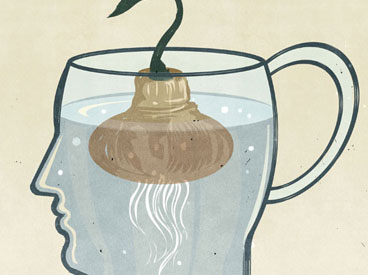Natural painkillers in the brain and dopamine in the brain: Their activation by a patient’s hopes, beliefs, and expectations, explains many placebo responses, but not all. There is a third way to invoke a placebo response, and it has to do with some famous dogs. About a century ago, Russian physiologist Ivan Pavlov discovered what is called the conditioned response. In his famous experiments, he rang a bell and gave his dogs food—an association he drummed into them over and over. Eventually, he rang a bell but did not feed them; the dogs salivated anyway. Their bodies had learned to associate a bell with chow, and even without the chow their physiology reacted. Might something similar happen to patients who had learned that a signal (a pill, say) was followed by the relief of pain?
The answer is yes: Conditioned responses are a third way the placebo response works. In one elegant experiment demonstrating this phenomenon, scientists showed 40 volunteers two male faces on a computer screen for 0.1 second. When the volunteers looked at one face, they got a mild burn on their forearm; when they looked at the other, they got a more painful burn. The volunteers became as conditioned as Pavlov’s dogs. In the next round when they saw the high-pain face and felt a burn, they rated it as more painful than when they saw the low-pain face and felt a burn—even though the applied heat was identical the second time around. Conditioned responses also account for why someone who regularly gets airsick feels nauseated while the plane is still on the tarmac: The physiological memory that equates airplanes with nausea kicks in at the mere experience of sitting in a plane. Even when the scientists flashed the faces too quickly (for 12 milliseconds) for volunteers to consciously perceive, the volunteers again felt less pain when the low-pain face flashed than when the high-pain face did—even though, again, the burning intensity was identical. The perception of pain, says Ted Kaptchuk of Harvard Medical School, who helped lead the 2012 study, depends on “what the nonconscious mind anticipates despite any conscious thoughts.”
The placebo effect doesn’t even depend on deception. It can kick in even when people are told they are receiving an inactive drug. For instance, in a 2010 study led by Harvard’s Kaptchuk, scientists recruited 80 people with irritable bowel syndrome, or IBS, and gave half no treatment and half what they were told were “placebo pills made of an inert substance, like sugar pills, that have been shown in clinical studies to produce significant improvement in IBS symptoms through mind-body, self-healing processes.” It was full disclosure. Even without the deception, the placebo-takers’ IBS symptoms improved over the course of three weeks. That response suggests another avenue for the placebo response: ritual.
For all the progress scientists have made in understanding the placebo response, mysteries remain. No one knows whether certain personality types, ages, genders, or nationalities are more susceptible to the placebo response—though Beauregard notes that placebos don’t work as well in skeptical people as they do in trusting souls. And one 2009 study of a placebo anti-depressant found that people who are highly religious tend to have a stronger placebo response.
Even as the research continues, the power of placebo raises important questions about medical practice in the 21st century. Some, if not much, of the benefit from seeing a doctor and receiving a treatment comes from our belief in that doctor and our expectation that the treatment will work. Will we have the same expectations of an online visit, explaining our symptoms impersonally over the Internet? Will we have the same expectations of a virtual doctor with an artificial intelligence system evaluating our symptoms and lab results and recommending treatment? If caring from a human being—remember mom making the skinned knee feel better—triggers the placebo effect, can a computer?
Today, more and more doctors are applying the placebo effect in their practices, not by lying to patients about a treatment (which is unethical), but by recommending relaxation therapy, meditation, and other mind-based practices. “The healer is a crucial component of the placebo response,” said Beauregard. “It would be a shame if we lost that” as technology advances.
To view a video of Ted Kaptchuk discussing his most recent placebo study, go to saturdayeveningpost.com/placebo-effect.
Become a Saturday Evening Post member and enjoy unlimited access. Subscribe now



